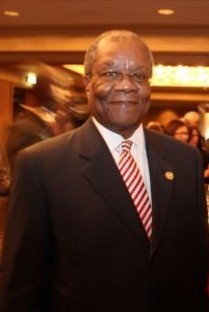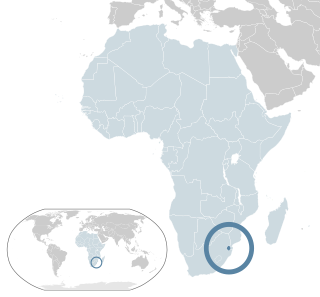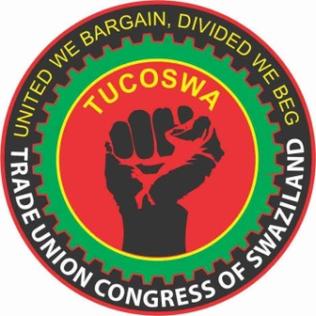
Eswatini, officially the Kingdom of Eswatini and also known by its former official name Swaziland, is a landlocked country in Southern Africa. It is bordered by Mozambique to its northeast and South Africa to its north, west, south, and southeast. At no more than 200 km (120 mi) north to south and 130 km (81 mi) east to west, Eswatini is one of the smallest countries in Africa; despite this, its climate and topography are diverse, ranging from a cool and mountainous highveld to a hot and dry lowveld.
The Umbutfo Eswatini Defence Force (UEDF) is the military of the Southern African Kingdom of Eswatini (Swaziland). It is used primarily during domestic protests, with some border and customs duties; the force has never been involved in a foreign conflict. The army has struggled with high rates of HIV infection. Since measures were put in place the rate is dropping.

Mswati III is Ngwenyama (king) of Eswatini and head of the Swazi royal family.

The Swazi or Swati are a Bantu ethnic group native to Southern Africa, inhabiting Eswatini, a sovereign kingdom in Southern Africa, and South Africa's Mpumalanga province. EmaSwati are part of the Nguni-language speaking peoples whose origins can be traced through archaeology to East Africa where similar traditions, beliefs and cultural practices are found.

Sobhuza II,, was Ngwenyama (King) of Swaziland for 82 years and 254 days, the longest verifiable reign of any monarch in recorded history.

The People's United Democratic Movement is the largest opposition party in Eswatini. It is a democratic socialist party. Formed in 1983 at the University of Eswatini, it is led by Mlungisi Makhanya. The Swazi government has been monitoring PUDEMO closely since it launched the Ulibambe Lingashoni campaign, which aims for a "total liberation" of Eswatini, and has recently cracked down heavily on even small manifestations of support for PUDEMO, such as the death in custody of PUDEMO member Sipho Jele, who was arrested for wearing a PUDEMO t-shirt in May 2010.
Mario Thembeka Masuku was a Swazi politician who was the leader of the People's United Democratic Movement (PUDEMO), Eswatini's banned opposition party.

Prince Barnabas Sibusiso Dlamini was a Swazi politician who served as Prime Minister of Eswatini, from 1996 to 2003 and again from October 2008 to September 2018.

The Central Bank of Eswatini, is the central bank of Eswatini. It was established in April 1974 and is based in capital Mbabane. According to the bank's website, the bank's mission is to promote monetary stability and foster a stable and sound financial system. Among the bank's responsibilities are managing Eswatini's foreign exchange position and safeguarding the country's foreign reserves of cash. The bank conducts weekly auctions of 91-day Swazi treasury bills, through "primary dealer" Swazi banks. The current governor is Dr. Phil Mnisi.

Lesbian, gay, bisexual, and transgender (LGBT) people in Eswatini have limited legal rights. According to Rock of Hope, a Swati LGBT advocacy group, "there is no legislation recognising LGBTIs or protecting the right to a non-heterosexual orientation and gender identity and as a result [LGBT people] cannot be open about their orientation or gender identity for fear of rejection and discrimination". Homosexuality is illegal in Eswatini, though this law is in practice unenforced. According to the 2021 Human Rights Practices Report from the US Department of State, "there has never been an arrest or prosecution for consensual same-sex conduct."
The Swaziland National Union of Students is a membership-based organisation of students in all higher institutions of learning in Swaziland. It seeks to create a student movement and geared to confront the socio economic and political challenges of the country. The organisation also advocates an education policy that is informed by the economic demands faced by the country and the democratisation of Swazi society.
The Swaziland National Ex-Mine Workers Association (SNEMA) is an organisation of ex-miners, who at one point were employed in mines in South Africa. The organisation has over 700 members. Many of the members have sustained injuries or illness from working in the mines, and have been declared redundant. And many of the ex-mineworkers have not been compensated for these injuries or paid the pensions they are due.
Swazi Media Commentary is a blog written by former associate professor in journalism and mass communication at the University of Swaziland, Richard Rooney. The Blog discusses and informs about the political and human rights situation in Swaziland, focusing primarily on media freedom and the ethical issues of journalism practitioners in newspapers and other media.

Sipho Jele was a member of the banned Swazi political party People's United Democratic Movement (Pudemo) as well as the Swaziland Agricultural and Plantations Workers Union (SAPWU), part of the Swaziland Federation of Trade Unions (SFTU). He died in police custody in Swaziland, after having been arrested on 1 May 2010, at the SFTU May Day celebrations, for having worn a T-shirt with a Pudemo logo. Sipho Jele was found hanging from the rafters of a toilet at the Sidvwashini Correctional facility where he was being held on 4 May.
Pius Vilakati is a Swazi democracy activist, as well as the former President of the University of Swaziland Student Representative Council (SRC) and a former prominent member of the Swaziland National Union of Students (SNUS).

In Eswatini, no king can appoint his successor. Instead, an independent special traditional Council called the Liqoqo decides which of the wives shall be "Great Wife" and "Indlovukazi". The son of this "Great Wife" will automatically become the next king.

The Trade Union Congress of Eswatini (TUCOSWA) is a Swazi trade union federation.
Mcebo Dlamini is an Swazi-born South African politician who was one of the prominent leaders of the #FeesMustFall protests in South Africa which led to a conversation on the introduction of free tertiary education for the poor, mainly black students, in the country.
Sibongile Ndlela-Simelane was Minister for Health for Eswatini from 2013 to 2018 under the government of Barnabas Sibusiso Dlamini. During her time as minister she led calls for lessons from southern Africa's HIV response to be applied to malaria. She also commissioned on World TB Day in 2017 a national drug resistance survey. In 2018 she requested the arrest of a Eswatini Observer journalist who had photographed the cars of government ministers. She also commissioned new offices for the Swaziland Nursing Council.











